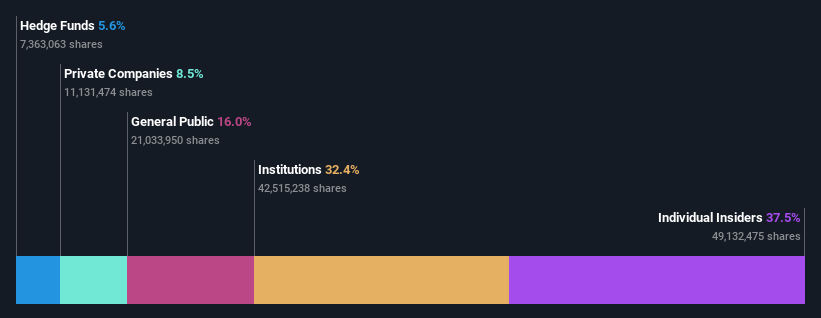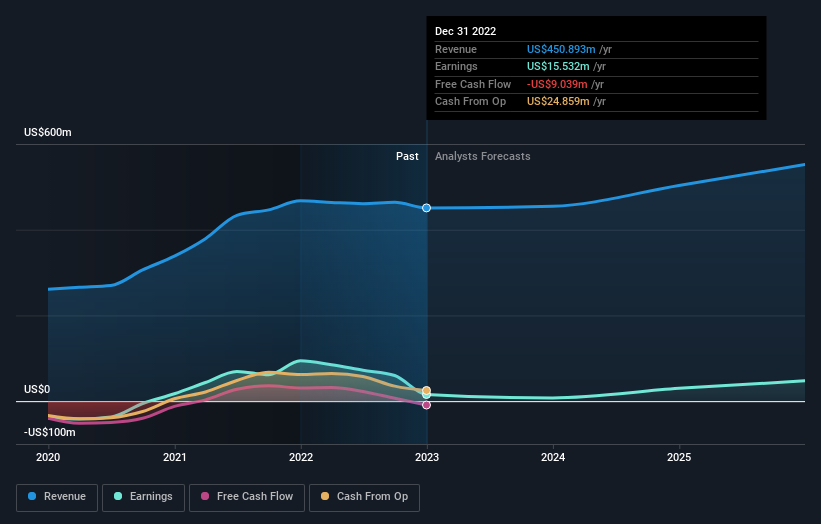Despite recent sales, Organogenesis Holdings Inc. (NASDAQ:ORGO) insiders still hold the largest share with a 37% interest
Key Insights
Insiders appear to have a vested interest in Organogenesis Holdings' growth, as seen by their sizeable ownership
52% of the business is held by the top 7 shareholders
To get a sense of who is truly in control of Organogenesis Holdings Inc. (NASDAQ:ORGO), it is important to understand the ownership structure of the business. And the group that holds the biggest piece of the pie are individual insiders with 37% ownership. That is, the group stands to benefit the most if the stock rises (or lose the most if there is a downturn).
Despite recent sales, insiders own the most shares in the company.
In the chart below, we zoom in on the different ownership groups of Organogenesis Holdings.
Check out our latest analysis for Organogenesis Holdings
What Does The Institutional Ownership Tell Us About Organogenesis Holdings?
Many institutions measure their performance against an index that approximates the local market. So they usually pay more attention to companies that are included in major indices.
Organogenesis Holdings already has institutions on the share registry. Indeed, they own a respectable stake in the company. This implies the analysts working for those institutions have looked at the stock and they like it. But just like anyone else, they could be wrong. If multiple institutions change their view on a stock at the same time, you could see the share price drop fast. It's therefore worth looking at Organogenesis Holdings' earnings history below. Of course, the future is what really matters.
It would appear that 5.6% of Organogenesis Holdings shares are controlled by hedge funds. That worth noting, since hedge funds are often quite active investors, who may try to influence management. Many want to see value creation (and a higher share price) in the short term or medium term. Alan Ades is currently the largest shareholder, with 12% of shares outstanding. Glenn Nussdorf is the second largest shareholder owning 11% of common stock, and Dennis Erani holds about 7.7% of the company stock.
We did some more digging and found that 7 of the top shareholders account for roughly 52% of the register, implying that along with larger shareholders, there are a few smaller shareholders, thereby balancing out each others interests somewhat.
While studying institutional ownership for a company can add value to your research, it is also a good practice to research analyst recommendations to get a deeper understand of a stock's expected performance. There is a little analyst coverage of the stock, but not much. So there is room for it to gain more coverage.
Insider Ownership Of Organogenesis Holdings
The definition of an insider can differ slightly between different countries, but members of the board of directors always count. The company management answer to the board and the latter should represent the interests of shareholders. Notably, sometimes top-level managers are on the board themselves.
I generally consider insider ownership to be a good thing. However, on some occasions it makes it more difficult for other shareholders to hold the board accountable for decisions.
Our most recent data indicates that insiders own a reasonable proportion of Organogenesis Holdings Inc.. Insiders have a US$101m stake in this US$269m business. We would say this shows alignment with shareholders, but it is worth noting that the company is still quite small; some insiders may have founded the business. You can click here to see if those insiders have been buying or selling.
General Public Ownership
The general public-- including retail investors -- own 16% stake in the company, and hence can't easily be ignored. While this group can't necessarily call the shots, it can certainly have a real influence on how the company is run.
Private Company Ownership
It seems that Private Companies own 8.5%, of the Organogenesis Holdings stock. Private companies may be related parties. Sometimes insiders have an interest in a public company through a holding in a private company, rather than in their own capacity as an individual. While it's hard to draw any broad stroke conclusions, it is worth noting as an area for further research.
Next Steps:
It's always worth thinking about the different groups who own shares in a company. But to understand Organogenesis Holdings better, we need to consider many other factors. To that end, you should be aware of the 4 warning signs we've spotted with Organogenesis Holdings .
Ultimately the future is most important. You can access this free report on analyst forecasts for the company.
NB: Figures in this article are calculated using data from the last twelve months, which refer to the 12-month period ending on the last date of the month the financial statement is dated. This may not be consistent with full year annual report figures.
Have feedback on this article? Concerned about the content? Get in touch with us directly. Alternatively, email editorial-team (at) simplywallst.com.
This article by Simply Wall St is general in nature. We provide commentary based on historical data and analyst forecasts only using an unbiased methodology and our articles are not intended to be financial advice. It does not constitute a recommendation to buy or sell any stock, and does not take account of your objectives, or your financial situation. We aim to bring you long-term focused analysis driven by fundamental data. Note that our analysis may not factor in the latest price-sensitive company announcements or qualitative material. Simply Wall St has no position in any stocks mentioned.
Join A Paid User Research Session
You’ll receive a US$30 Amazon Gift card for 1 hour of your time while helping us build better investing tools for the individual investors like yourself. Sign up here


